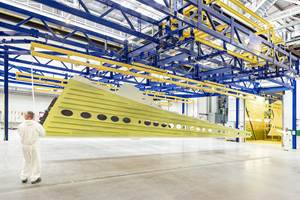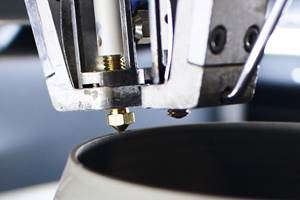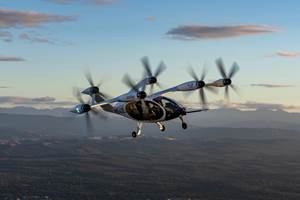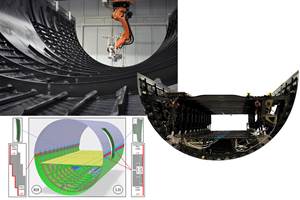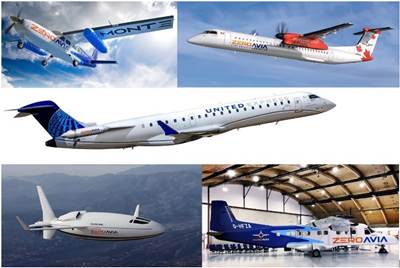H2fly begins LH2 tank integration into HY4 test aircraft
Liquid tank passes vibration and leakage test, kickstarting the mechanical integration process and rigorous ground testing early in 2023 for zero-emissions commercial flight.
Share
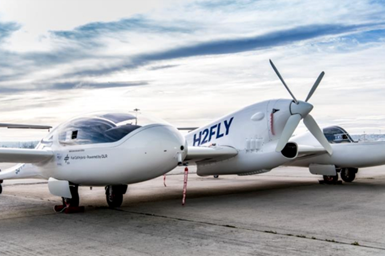
Photo Credit: H2Fly
H2fly (Stuttgart, Germany), a spin-off from the German Aerospace Center (DLR) that is developing hydrogen fuel cell systems for aircraft, and its partners, has begun the integration of a liquid hydrogen (LH2) storage system tank into its HY4 aircraft. The integration process commenced following the tank passing the vibration and LH2 leakage testing phase at Air Liquide (Paris, France) in September.
The announcement marks a significant step forward for Project HEAVEN — an initiative which has set out to design, develop and integrate a powertrain based on high-power fuel cell and cryogenic technology, into an existing aircraft for testing in-flight operation. The start of the mechanical integration process draws H2fly closer to achieving higher aircraft ranges, which is critical in the pursuit of achieving true zero-emissions medium and long-haul flight.
H2fly supplies the complete fuel cell system supporting the composites-intensive HY4 aircraft, along with the integration platform and the overall system architecture and controls of the fuel cell and hydrogen storage system. As the development lead, H2fly plays a critical role in the complete coordination of the system implementation to guarantee each of the system parts is properly adapted, ensuring safe functionality.
The company is joined by the following partners for the HEAVEN project: Air Liquide Advanced Technologies, a cryogenic tank designer and supplier; Pipistrel Vertical Solutions (Ajdovščina, Slovenia), which will be supporting the integration and demonstration of the tank; and the DLR, supporting the operation and testing of high power fuel cell and system architecture.
Integration work is expected to be completed over the coming months. Following the integration of the new hydrogen storage system and fuel cells, the aircraft is planned to enter a rigorous program of ground testing early in 2023.
“For the past 10 years, at H2fly we have been focused on developing and delivering new technology and now we look forward to completing the integration process so we can begin ground testing in preparation for the world’s first commercial liquid hydrogen-electric aircraft,” Prof. Dr. Josef Kallo, co-founder and CEO of H2fly, says.
The HEAVEN project has received funding from the Fuel Cells and Hydrogen 2 Joint Undertaking (JU) under grant agreement No 826247. The JU receives support from the European Union’s Horizon 2020 research and innovation program and Spain, France, Germany and Slovenia.
Related Content
Plant tour: Spirit AeroSystems, Belfast, Northern Ireland, U.K.
Purpose-built facility employs resin transfer infusion (RTI) and assembly technology to manufacture today’s composite A220 wings, and prepares for future new programs and production ramp-ups.
Read MoreA new era for ceramic matrix composites
CMC is expanding, with new fiber production in Europe, faster processes and higher temperature materials enabling applications for industry, hypersonics and New Space.
Read MorePlant tour: Joby Aviation, Marina, Calif., U.S.
As the advanced air mobility market begins to take shape, market leader Joby Aviation works to industrialize composites manufacturing for its first-generation, composites-intensive, all-electric air taxi.
Read MoreManufacturing the MFFD thermoplastic composite fuselage
Demonstrator’s upper, lower shells and assembly prove materials and new processes for lighter, cheaper and more sustainable high-rate future aircraft.
Read MoreRead Next
ZeroAvia advances to certify ZA600 in 2025, launch ZA2000 with liquid hydrogen in 2027
Lightweight composite tanks are key to ZeroAvia’s vision for H2 aircraft to rival range and utility of jet fuel aviation.
Read MoreThe next 10 years in commercial aviation and composites
Aviation Week discusses all-composite plane at Boeing, new composite wing at Airbus and trends driven by sustainability — composites are a key enabler for future aviation.
Read MorePlant tour: Daher Shap’in TechCenter and composites production plant, Saint-Aignan-de-Grandlieu, France
Co-located R&D and production advance OOA thermosets, thermoplastics, welding, recycling and digital technologies for faster processing and certification of lighter, more sustainable composites.
Read More

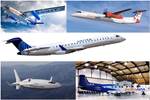













.jpg;maxWidth=300;quality=90)



